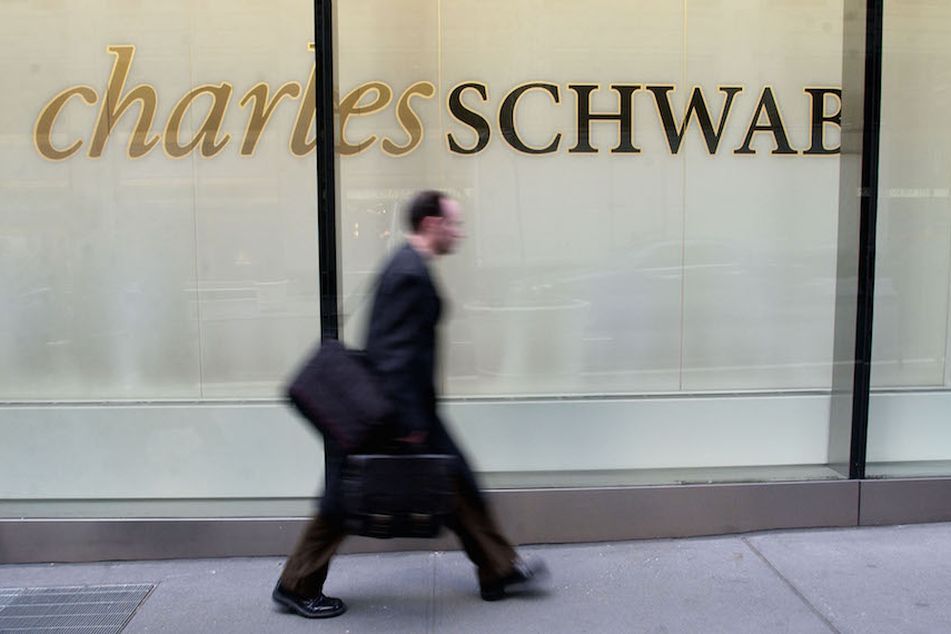Advisers shrug off Schwab’s potential purchase of USAA brokerage
 The Charles Schwab logo hangs in the window of an investment center in New York on Nobember 14, 2003. Charles Schwab Corp., pioneer of the mutual fund supermarket, found evidence of possible illegal customer trading in some of the 3,000 funds it sells, and was
subpoenaed by New York State Attorney General Eliot Spitzer. Photographer: Daniel Acker/Bloomberg News.
The Charles Schwab logo hangs in the window of an investment center in New York on Nobember 14, 2003. Charles Schwab Corp., pioneer of the mutual fund supermarket, found evidence of possible illegal customer trading in some of the 3,000 funds it sells, and was
subpoenaed by New York State Attorney General Eliot Spitzer. Photographer: Daniel Acker/Bloomberg News.
The reported $2 billion deal could close within a month, adding 100,000 new clients to Schwab's adviser referral program.
Charles Schwab Corp.’s rumored plan to acquire $100 billion worth of brokerage assets from USAA is perceived by market watchers as a prudent asset-gathering move, despite past missteps by the San Francisco-based brokerage giant.
“Schwab will give USAA clients expanded brokerage offerings and most of them will stay with USAA for their insurance products,” said Greg O’Gara, senior research analyst at Aite Group’s wealth management practice.
“When they press that button [to complete the acquisition], they will know there might be 100,000 accounts with north of $500,000 in them, and those accounts will be eligible to go into the Schwab adviser network, so those RIAs could see this as an opportunity to gain clients,” he added.
Talk of the deal, valued at $2 billion, was first reported earlier this week by the Wall Street Journal. So far, neither Schwab nor San Antonio, Texas-based USAA has confirmed the negotiations, but unnamed sources in the Journal story said the deal could be completed within a month.
The sale of the brokerage business would follow USAA’s sale of its $70 billion asset management business to Victory Capital for $850 million, which was completed earlier this month. That deal was originally reported in November.
Mr. O’Gara said USAA, which traditionally has marketed itself to active and former members of the military and their families, will continue to develop its diverse insurance business.
“I see it as a great deal for Schwab and USAA, and especially for USAA clients,” he said. “If the accounts were branded Schwab accounts, USAA could build onto the Schwab brokerage platform. I would imagine USAA could promote this as something that’s good for USAA clients.”
For financial advisers currently participating in Schwab’s referral program, Mr. O’Gara said 95% of the accounts will likely not qualify for personalized service beyond what the brokerage platform offers. But if just 5% of the accounts coming over from USAA fit the mass-affluent range of around $500,000, that will represent new business opportunities for financial advisers.
“The wealth management business has been a great division of USAA and a big part of their value proposition to veterans and their families,” said Daniel Seivert, chief executive of investment bank Echelon Partners.
“Given its focus on ETFs and model-based asset allocation solutions and its focus on smaller client sizes, it is a natural fit for Schwab, which not only has a wide array of in-house solutions for these clients, but is also at a scale that is much, much higher than that of USAA,” Mr. Seivert said. “This all means that Schwab’s cost are likely much lower and the opportunities for synergies when taking over USAA business in these areas are huge.”
For Schwab, which has $3.5 trillion in platform assets, the potential USAA deal is sparking comparisons to its $2.7 billion purchase of U.S. Trust in 2000.
In 2007, Schwab sold that business to Bank of America for $3.3 billion, but Mr. O’Gara said that acquisition stands out as a rare misstep for the discount brokerage behemoth.
“The USAA deal is a stark contrast to the U.S. Trust deal, which didn’t work out for them,” he said. “In that case, it was at a time when Schwab didn’t really have a clear value proposition, but they eventually refocused on the core value proposition of the mass affluent market of investors with $500,000 and below.”
For financial advisers who custody client assets with Schwab, the message seems clear that there is more upside from potential client referrals than downside from Schwab trying to compete with advisers.
“I don’t view Schwab or USAA as competitors because they provide limited financial advice,” said David Bize, an adviser at First Allied Advisory Services.
Dennis Nolte, vice president of Seacoast Investment Services, said he sees the acquisition of USAA’s brokerage business as a basic asset grab.
“It’s the way of the world, and if advisers don’t have a value proposition they deliver, and where the clients are willing to pay for that value, they are going the way of the dinosaur,” he said.
Jen Butler, director of asset management and brokerage research at Corporate Insight, also called the potential deal logical and well-suited to Schwab.
“It contributes directly to their bottom line because they certainly have the scale and ability to handle the additional assets,” she said. “For Schwab, the focus is on gathering and managing assets, and they should be aggressive.”
For USAA, Ms. Butler said, “brokerage is not their core competency, and this is something that didn’t work out for them.”
Mr. Seivert of Echelon said the deal looks good for all parties involved and added that USAA is likely getting back to its original focus of providing insurance to military families.
“It is not clear if Schwab approached USAA or if the division was shopped,” he said. “It is clear that this asset will have much better economics in the hands of Schwab to own and manage it.”
Learn more about reprints and licensing for this article.








